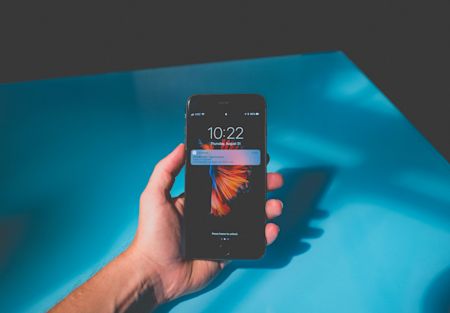Get my 5-Day Workplace Challenge for happier teams
This is a simple challenge for workplaces anywhere and everywhere.
Get an annual subscription to The Body Coach app for just £69.99 (usually £89.99)

Phone addiction is nothing new, but it’s perhaps becoming harder to ignore.
Our phones are literally designed to keep us hooked to them. All those notifications give us a tiny hit of dopamine that keeps us coming back for more… and we all know how easy it can be to check one message, then still be scrolling an hour later.
Without us realising, “doom-scrolling” can leave us feeling unmotivated, distracted, and even anxious.
It’s hard to suddenly dramatically reduce your phonetime, but there are small, intentional changes you can make to help you build a healthier relationship with your screen.
Daisy Greenwell, co-founder and director of Smartphone Free Childhood, has been on a mission to reduce her phone habits – and that of 1000s of others, too. So how can we learn to put our phone down a little bit more, and reap the benefits?
“If you find that your phone is distracting part of your brain when you’re face-to-face with humans you love, that’s a point to do something about it,” says Daisy.
Daisy hit the point (after being in too many WhatsApp groups with notifications turned on) where she felt like she’d disappeared into her phone. She knew she had to put better rules in place. Some suggestions won’t suit everyone, but others might be exactly what you need.
Rethink the alarm clock. “This can make a massive difference,” says Daisy. Many people use their phones as their alarm clocks, meaning it has to be in the room with them every night. But you might notice a “sense of relief” putting your phone away for the night in another room. It’s not healthy to look at your phone first thing in the morning, so having an alarm clock means you can have some time where you’re not instantly back into the dopamine loop of your phone.
Turn off notifications and have “check” times. “It takes a second to break your attention – and 20 minutes to get back into deep work,” explains Daisy. “If you’re constantly picking up your phone to have a look, you’re not going nearly as deep as you could be if you weren’t.” She suggests turning off notifications, and making sure YOU decide when to look at your phone, rather than being told to look at it by an alert. “Give yourself check times,” she says. “Times to check it throughout the day rather than every 10 minutes.”
Try the Brick app. “This is more extreme,” explains Daisy, “but it turns your phone to calls and texts just by touching it on the app. If you really struggle, it’s helpful and helps your brain to think, ‘I’ve got to focus now and can’t have distractions’.” If that’s too extreme, you could try putting your phone in a drawer, in a different room, or in a hard-to-get place to resist the temptation.
Create friction in your phone journey. This might sound strange, but Daisy advises putting an elastic band on your phone to “create a bit of friction” in the journey from picking up your phone, to scrolling. It’s almost like a physical barrier that will remind you, ‘Do I need to do this?’. “Practice putting it down at that moment instead,” she said. Another way to create friction could be to put your most used apps into a folder, she suggests, so they are less accessible and it takes a few more clicks to get to them.
Use your phone when it’s needed. The issue with the modern world is that everything is on our phones: our diaries, our cards, our communication with loved ones. “It’s easy to berate ourselves and beat ourselves over the head about guilt and shame, but some phone use is fine and we should be doing that – it’s an amazing tool,” says Daisy. Trying not to go on your phone at all is unrealistic.
The things we know are more of a waste of time – social media, for example – is when we should be more aware, and know that our time could be filled with something more nourishing like cooking or reading a book.
Remember you’re a role model. For parents specifically, being on your phone can make your child feel like they’re less important than you, says Daisy. “They’ll think it’s an okay way to behave.” Save moments on your phone when you’re not around loved ones.
It’s hard and we can’t always be perfect. “Even if you reduce your screen time for a week or two, let yourself remember your phone isn’t more important than the real life around you,” says Daisy.
And remember, you might feel the pressure to always be available on your phone – but it’s “cool to not be instantly replying – and many people actually respect this.”
Daisy Greenwell is the founder of Smartphone Free Childhood. They have the Parent Pact, a pledge among parents to delay giving their children smartphones, typically until at least age 14, to support healthier social development, mental wellbeing, and real-world connection.